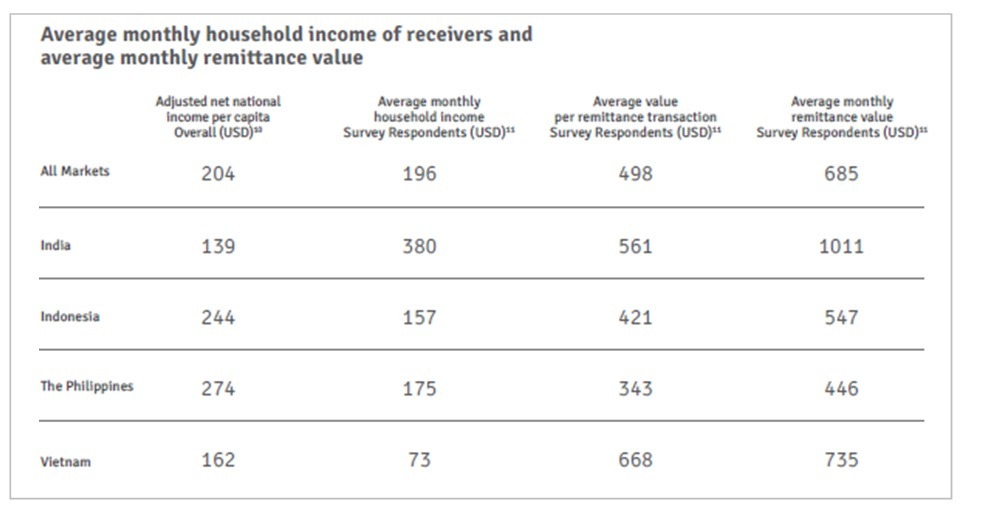 |
The report, titled Both Sides of the Coin: The Receiver’s Story, is the first instalment of UniTeller’s research into the behaviours and attitudes of low-income remittance recipients in the Philippines, India, Indonesia and Vietnam regularly receiving money from senders in Hong Kong, Singapore, and the United States.
It finds the average monthly remittance value sent back by low-income overseas Vietnamese migrants is US$735, compared to their receiver’s average monthly household income of US$73. Vietnam is expected to remain the ninth largest remittance receivers in the world with an estimated inflow of US$16.7 billion by end of 2019, according to the World Bank.
The study surveyed 301adults from low-income households in Vietnam using online and and face-to-face interviews in September. It was part of a larger study that involved a total of 1,911 respondents among low-income households in Indonesia, India, the Philippines and Vietnam.
Poor financial planning and rising overdependence
According to the report, almost half of remittances received by Vietnamese households are used for day-to-day family needs (24%) and bill and loan repayments (25%). The report also reveals that much smaller sums are being apportioned to areas that may further economic progress, including education (11%) and savings (14%), and relatively high amounts are spent on non-essential luxury items (9%).
This poor financial planning is exacerbated by almost one-in-five (21%) of remittance recipients in Vietnam saying they regularly run out of money.
35% of Vietnamese recipients say that they will reach out to their main sender when they run out of the money they receive, with 65% saying that they will reach out to other family and
friends and 37% saying they will ultimately have to forgo day-to-day needs if this happens.
 |
The survey further finds that a reliance on remittances may also placing increasing stress on the relationship between senders and receivers. Two-in-five (43%) report that the expectation of receiving remittance places emotional stress on their family and 31% saying that it impacts their relationship with the sender.
When it comes to who calls the shots on financial planning, almost all of the receivers (99%) say they have the final say on how remittance funds are allocated. This suggests a considerable level of trust in the decision-making capabilities of the recipients. This view is supported by the survey result that 99% of recipients kept a close track of their savings and expenses.
Although the report highlights that receivers do not allocate enough of the remittances to savings, there are untapped opportunities to increase their capacity in building sustainable wealth. 59% of regular remittance recipients in Vietnam say they are extremely eager to learn and cultivate good financial habits.
The dawn of digital
 |
As a sign of growing digitalisation of financial services in the Vietnam, the survey reveals that 92% of respondents have a mobile wallet account and 99% have a smartphone. While the most common method of receiving international money transfers is via electronic transfer into an existing bank account (68%), cash pick-ups remains relatively high as a go-to option at 45%, followed by mobile wallets (42%).
Indicating the appetite for this to change, 91% are receptive to a semi-digital payments solution that would allow them to initially confirm the transaction online and then subsequently fulfil the transaction at a physical location.
 |
Amid these changes, concerns around cyber security are a rising issue, with 59% of the respondents expressing this as an issue, followed by concerns around processes being too complex at 45% and not being able to receive funds at 41%.
UniTeller is an international payments company based in the United States. A market leader in international remittance and cross border payment processing services, UniTeller’s extensive payment network spans 34 countries and 125,000 payment locations worldwide. In 2001, UniTeller expanded its services to the growing Asia Pacific market and opened its first office in Manila, Philippines.
Hoai Nam
 As global remittances hit record highs, a new report by UniTeller of low-income adults in Vietnam reveals the value of monthly remittances from family and friends working abroad now averages ten times of the monthly incomes of recipients.
As global remittances hit record highs, a new report by UniTeller of low-income adults in Vietnam reveals the value of monthly remittances from family and friends working abroad now averages ten times of the monthly incomes of recipients.